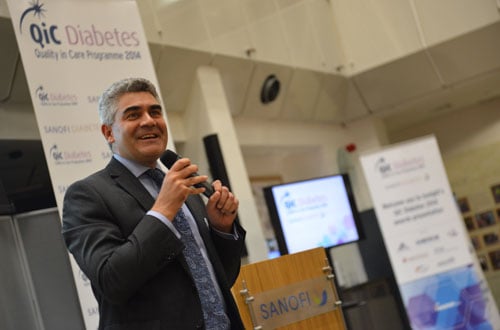
Prof Jonathan Valabhji, National Clinical Director for Obesity and Diabetes, presenting an award at QiC Diabetes 2014
It’s no secret that diabetes is one of the major challenges facing healthcare systems across the world. Few governments are unaware of the impact both type 1 and type 2 variations of the condition can have on a person, and the need to implement effective measures in diabetes prevention, care, management and education.
Putting this knowledge into practice can be another matter entirely, however, especially as global diabetes rates continue to rise due in part – in the case of type 2 diabetes – to sedentary lifestyles and an unhealthy diet. This is certainly the situation in UK, where there are 3.2 million people diagnosed with diabetes, but an individual’s quality of care remains a postcode lottery.
Recent research by Public Health England revealed that the main three treatment targets for diabetes – controlling blood pressure, blood sugar and cholesterol – are being met for only one in three people with diabetes in England. Furthermore, no region is doing a good job in hitting all three targets. Wigan Borough clinical commissioning group (CCG) and the NHS Knowsley CCG ranked the highest, with just under half the diabetes population achieving all three targets, while the lowest ranked CCG was NHS West Suffolk, where the figure was 28.5%.
This variation was criticised by many healthcare figures, including Dame Barbara Young, chief executive of the charity Diabetes UK.
She said: “This is just the latest in a long line of statistics that show that diabetes healthcare is hugely geographically variable and in many places is not good enough. The public deserve more than politicians and NHS leaders wringing their hands about it but then failing to do anything meaningful to try to fix it.
“The end result is that while some areas provide good quality care, too many people have substandard care that is putting their future health at risk.”
And Dame Barbara is right. Substandard care is putting people with diabetes at risk of developing complications, some of them life threatening. But she is also right when she says that there is good quality care out there. The issue is that this good care is not being spread across the country into areas where improvement is needed.
There is a shared awareness that this needs to change and there are groups trying to change that siloed thinking in the NHS, including NHS Improving Quality and Diabetes UK itself.
Add to that list the Quality in Care (QiC) Programmes, which were set up in 2011 to recognise and share good practice in patient care and joint working in key therapy areas via an awards event and subsequent disseminated opportunities.
The first and largest QiC Programme is QiC Diabetes, which has so far celebrated more than 125 initiatives improving the lives of people with diabetes in the UK and shared this work by featuring case studies on the QiC Connect website, organising winning teams to speak at conferences and providing a network for healthcare professionals to discuss diabetes care.
A video of QiC Diabetes 2013
This year’s awards – run in partnership with Sanofi and supported by Diabetes UK for the fourth year in a row – highlighted a diverse range of diabetes projects across 14 categories, each representing a key issue in diabetes care, including primary care, dietary management and self care.
Among the winners was a team from the Cambridge University Hospitals NHS Foundation Trust who won the Judge’s Special Award – an award that the judges feel deserves national recognition and a platform to be shared with the wider diabetes community.
In this case the judges decided that the National Severe Insulin Resistance Service, a new national clinical service for patients with severe insulin resistance and/or lipodystrophy, was a worthy winner by overhauling the national approach to care in an area where diagnosis and management are complex and guidelines for management did not exist.
“This innovative programme shows there is a clear need for it and it’s brilliant to have secured funding from NHS England,” said the judges. “It had a huge impact on the niche patients involved.”
The initiative is an example of a bright idea developed by the NHS to improve the lives of people with diabetes that is now being shared across the country. There is good care out there and programmes like QiC Diabetes are helping to make sure more people know about it.
Medicine management: a novel approach to safe insulin prescribing
A multidisciplinary team at Imperial College Healthcare NHS Trust produced an insulin prescription drug ‘insert’ for in-patients that can be attached to each individual’s existing drug chart in order to aid the prescription and administration of insulin injections. This led to a 50% reduction in errors with the administration of the insulin, including no missed doses due to unprimed pens and no over corrections.
Improvement programme for pregnancy and maternity: PROCEED, Preconception Care for Diabetes in Derby/Derbyshire
PROCEED is a user-centred model for preconception care developed by Derby Hospitals NHS Foundation Trust that integrates care vertically across specialities, and horizontally across primary and secondary care. After 12 months, median waiting times were reduced from 13 to five weeks and the ‘did-not-attend’ rate from 18% to 5%. The PCC rate increased to 70% and the stillbirth rate fell from 6% in 2009/10 to 0%.
- More information on QiC Diabetes
- More diabetes case studies





